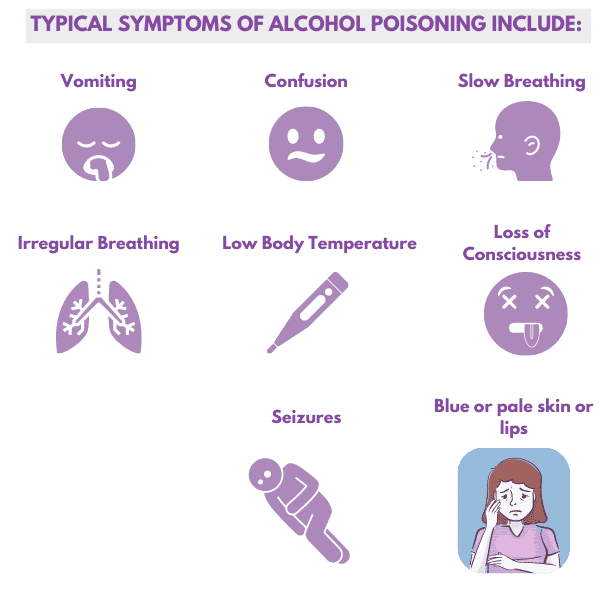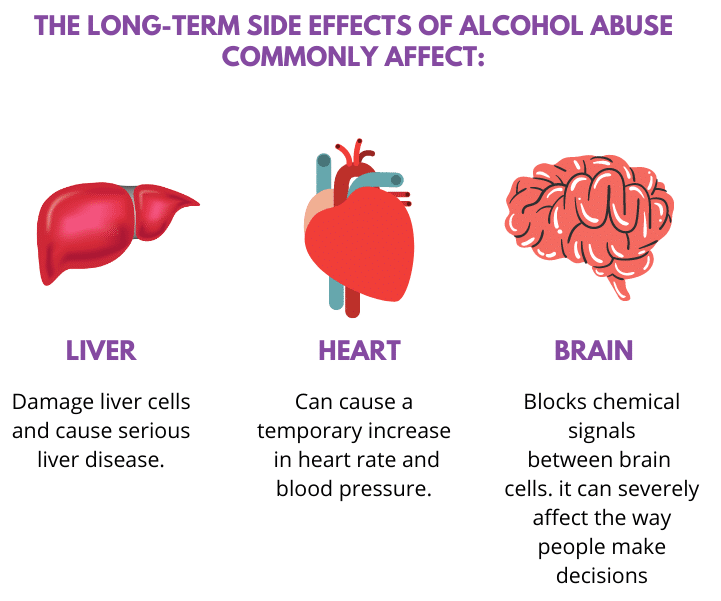The intoxicating side effects of alcohol may set in after only one or two drinks. While most people can drink safely and in moderation, others struggle with alcohol abuse or addiction. On the other hand, some people who don’t necessarily have a problem with alcohol may engage in binge drinking, a particularly dangerous drinking pattern that produces a variety of adverse side effects. As a result, it is important to know what the potential risks and dangers are of abusing alcohol or drinking chronically so you or a loved one know when it is time to intervene and get help.
Although drinking is a socially acceptable American past-time, excessive drinking is inarguably dangerous. In women, excessive drinking generally refers to having more than three drinks a day or seven in a week. In men, however, excessive drinking refers to having more than four drinks in a day and 14 in a week. When people drink to this extent, they are more likely to not only develop a dependence on alcohol but to suffer the side effects and consequences of alcohol abuse.
The best way to prevent experiencing any of the adverse side effects of chronic drinking is to stop drinking and get help. Our alcohol rehab in Fort Lauderdale is equipped with the clinical and medical resources to help you or a loved one recovery mentally, physically, and spiritually from alcoholism. However, it isn’t always easy to admit that you need help. Let’s look at the potential consequences of continued drinking to become aware of the vitality of seeking help.
Table of Contents
ToggleShort Term Side Effects of Alcohol
When alcohol is consumed, it is absorbed into the bloodstream through the stomach and small intestine. As blood vessels absorb the alcohol, the brain begins to respond to its effects. The rate at which a person becomes intoxicated depends on a variety of factors, such as:[1]
- How much alcohol is consumed and how quickly
- Sex, weight, and percent body fat
- How much the person has eaten that day
As the effects of alcohol begin to set in, people may feel relaxed, happy, or outgoing. Once more alcohol is consumed, people may show the following signs of intoxication:
- Lack of coordination
- Slurred speech
- Memory lapses
- Drowsiness
- Distorted senses and perception
- Bloodshot eyes
- Disorientation
- Vomiting
Even though the body absorbs alcohol quickly, it takes approximately one hour for the liver to process a standard drink. As a result, consuming several standard drinks in a short time is dangerous because it causes alcohol to build up in the body, putting bodily systems under extreme stress. This act is referred to as binge drinking – a dangerous pattern of alcohol consumption that often leads to alcohol poisoning.
Alcohol Poisoning
Alcohol poisoning usually occurs once a person’s blood alcohol content (BAC) reaches 0.45 or higher. Typical symptoms of alcohol poisoning include:[2]

It is important to note that people don’t have to show all of the above-listed symptoms to have alcohol poisoning. If you suspect someone is affected, it is imperative to call 911 immediately while keeping the individual sitting up or laying on their side to avoid aspiration while waiting for emergency medical services to arrive.
Poor Decision Making and Accidental Injury
When people drink to get intoxicated, they expect their inhibitions to be affected. However, when too much alcohol is consumed, it can severely affect the way people make decisions. As a result, this can lead to a variety of short term issues and side effects, including:
- Risky sexual behaviors such as unprotected sex
- Dangerous behaviors such as drink driving
- Accidental injury from lack of reflexes and coordination
Unfortunately, alcohol is inextricably linked to incidences such as car crashes, drowning, falls, domestic violence, suicide, and even homicide.
Long Term Side Effects of Alcohol Abuse
 </p
</p
People who continue to drink excessively and abuse alcohol are susceptible to serious physical and psychological issues. Moreover, excessive alcohol use is the 4th leading cause of preventable death in the United States.[3] The long-term side effects of alcohol abuse commonly affect the liver, brain, and heart.
Effects of Chronic Drinking on the Liver
Alcohol is metabolized by the liver, so this organ takes the hardest hit from alcohol abuse. When alcohol is metabolized, the body turns it into acetaldehyde, a toxic and carcinogenic substance. As a result, heavy drinking increases the risk of developing alcoholic fatty liver, alcoholic hepatitis, or cirrhosis – three types of alcohol-related liver disease (ALRD) that affect the function of the liver. If the liver fails to function fully, it can lead to multiple organ failure and even death. Unfortunately, symptoms of liver damage usually develop after significant damage has already been sustained.
Long Term Alcohol Abuse and the Brain
Although getting drunk is associated with blurred vision, memory loss, slurred speech, and slowed reaction times, long-term drinking affects the brain in various additional ways. For example, chronic drinking changes the way the brain’s receptors and neurotransmitters work. As a result, it can interfere with a person’s cognitive function, mood regulation, emotions, reactions, and behaviors.
Furthermore, alcohol may exacerbate neurological changes that increase the likelihood of risky or violent behaviors. Lastly, long-term chronic drinking may speed up the brain’s natural aging process, making alcoholics at a higher risk for early dementia.
How Alcoholism Affects the Heart
Heavy drinking is linked to high blood pressure. When the heart is exposed to the toxins from alcohol and constant high blood pressure, it can adversely affect the health and function of the heart. Ultimately, excessive and long-term alcohol intake is liked to several cardiovascular issues, such as angina, heart failure, high blood pressure, and stroke.
Other Long Term Side Effects of Heavy Alcohol Abuse
Even though chronic drinking primarily affects the liver, brain, and heart, alcohol actually affects virtually every internal organ and bodily system. As a result, the following additional health conditions are associated with long-term alcohol abuse.[3]
- Pancreatitis – nearly 70% of pancreatitis cases are in people who drink large quantities of alcohol.
- Cancer – heavy drinking is linked to cancers of the larynx, esophagus, stomach, liver, colon, rectum, mouth, breast, respiratory tract, and gastrointestinal tract.
- Gastrointestinal problems – alcohol abuse may lead to stomach ulcers, heartburn, acid reflux, or gastritis.
- Immune system problems – drinking damages the immune system, making the body at a higher risk for infectious diseases like HIV or pneumonia.
- Osteoporosis – heavy drinking leads to malnutrition and difficulty absorbing vitamins, which can ultimately lead to osteoporosis.
In the end, the only way to prevent experiencing the severe side effects of heavy alcohol abuse is to quit drinking entirely and seek professional help.
Get Help for Problem Drinking Today
Have you experienced adverse side effects from your alcohol consumption time and time again, yet find yourself unable to quit? Do you feel like you simply cannot function without taking a drink? If so, you may be addicted to alcohol. Even though alcoholism is difficult to overcome, the benefits of sobriety are well worth the journey. In fact, many of the negative health effects that come from heavy drinking will heal after months and years of abstinence. That’s why it is vital to seek help as soon as possible.
If you or a loved one are living with alcohol addiction, know that recovery is possible. Our substance abuse treatment professionals in Fort Lauderdale are well-versed in addressing and treating alcoholism, so we can help you get on the path towards a better life. Contact one of our dedicated addiction specialists today to get connected with an alcohol rehab near you today.
References:







